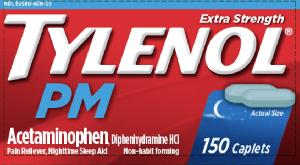Tylenol PM and Alcohol/Food Interactions
There are 3 alcohol/food/lifestyle interactions with Tylenol PM (acetaminophen / diphenhydramine).
Acetaminophen Alcohol (Ethanol)
Major Drug Interaction
Ask your doctor before using acetaminophen together with ethanol (alcohol). This can cause serious side effects that affect your liver. Call your doctor immediately if you experience a fever, chills, joint pain or swelling, excessive tiredness or weakness, unusual bleeding or bruising, skin rash or itching, loss of appetite, nausea, vomiting, or yellowing of the skin or the whites of your eyes. If your doctor does prescribe these medications together, you may need a dose adjustment or special tests to safely take both medications. It is important to tell your doctor about all other medications you use, including vitamins and herbs. Do not stop using any medications without first talking to your doctor.
Diphenhydramine Alcohol (Ethanol)
Moderate Drug Interaction
Ask your doctor before using diphenhydrAMINE together with ethanol (alcohol). Use alcohol cautiously. Alcohol may increase drowsiness and dizziness while you are taking diphenhydrAMINE. You should be warned not to exceed recommended dosages and to avoid activities requiring mental alertness. If your doctor prescribes these medications together, you may need a dose adjustment to safely take this combination. It is important to tell your doctor about all other medications you use, including vitamins and herbs. Do not stop using any medications without first talking to your doctor.
Acetaminophen Nicotine
Moderate Drug Interaction
Consumer information for this interaction is not currently available.
MONITOR: Smoking cessation may lead to elevated plasma concentrations and enhanced pharmacologic effects of drugs that are substrates of CYP450 1A2 (and possibly CYP450 1A1) and/or certain drugs with a narrow therapeutic index (e.g., flecainide, pentazocine). One proposed mechanism is related to the loss of CYP450 1A2 and 1A1 induction by polycyclic aromatic hydrocarbons in tobacco smoke; when smoking cessation agents are initiated and smoking stops, the metabolism of certain drugs may decrease leading to increased plasma concentrations. The mechanism by which smoking cessation affects narrow therapeutic index drugs that are not known substrates of CYP450 1A2 or 1A1 is unknown. The clinical significance of this interaction is unknown as clinical data are lacking.
MANAGEMENT: Until more information is available, caution is advisable if smoking cessation agents are used concomitantly with drugs that are substrates of CYP450 1A2 or 1A1 and/or those with a narrow therapeutic range. Patients receiving smoking cessation agents may require periodic dose adjustments and closer clinical and laboratory monitoring of medications that are substrates of CYP450 1A2 or 1A1.
Switch to professional interaction data
Tylenol PM drug interactions
There are 561 drug interactions with Tylenol PM (acetaminophen / diphenhydramine).
Tylenol PM disease interactions
There are 11 disease interactions with Tylenol PM (acetaminophen / diphenhydramine) which include:
- alcoholism
- liver disease
- depression
- PKU
- anticholinergic effects
- asthma/COPD
- cardiovascular
- renal/liver disease
- glaucoma
- liver disease
- resp depression
More about Tylenol PM (acetaminophen / diphenhydramine)
- Tylenol PM consumer information
- Check interactions
- Compare alternatives
- Pricing & coupons
- Reviews (37)
- Drug images
- Side effects
- Dosage information
- During pregnancy
- Support group
- Drug class: analgesic combinations
Related treatment guides
Drug Interaction Classification
| Highly clinically significant. Avoid combinations; the risk of the interaction outweighs the benefit. | |
| Moderately clinically significant. Usually avoid combinations; use it only under special circumstances. | |
| Minimally clinically significant. Minimize risk; assess risk and consider an alternative drug, take steps to circumvent the interaction risk and/or institute a monitoring plan. | |
| No interaction information available. |
See also:
Further information
Always consult your healthcare provider to ensure the information displayed on this page applies to your personal circumstances.


